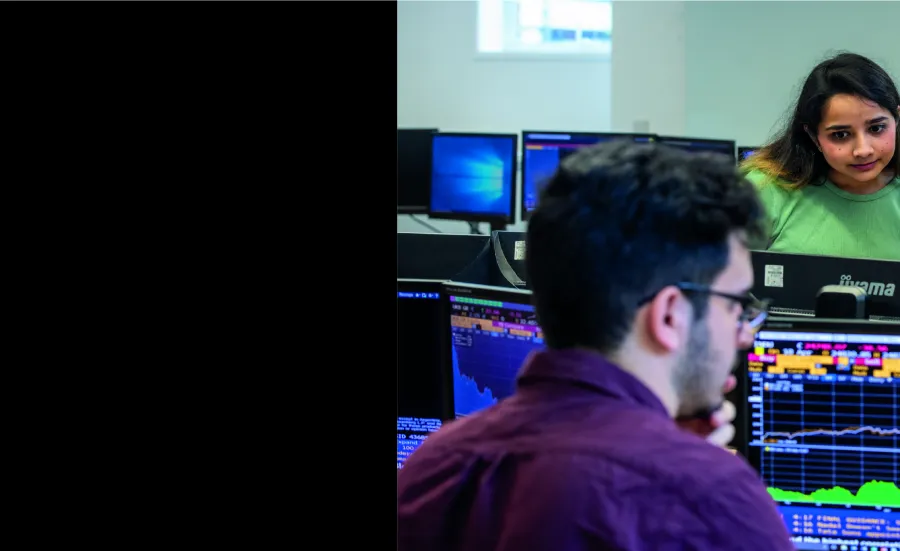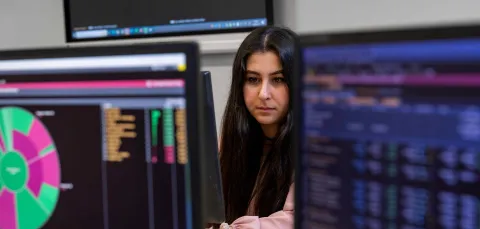About this course
Learn how economic decisions affect us as individuals and society as a whole. This Economics and Finance course combines studying economics with analysing financial markets and institutions. You'll gain the skills and knowledge to pursue a career in finance or economics.
Your A level results will determine which core or compulsory modules you'll need to take.
You'll learn from our expert teaching staff, whose research has influenced international policy.
In your first year you'll learn how to use Bloomberg trading terminals in our Financial Laboratory (FinLab), and have the chance to gain a Bloomberg Markets Concepts qualification.
You'll take core modules in:
- microeconomics
- macroeconomics
- quantitative methods
- finance
- accounting
You can also take modules from the Economics department, Business School or from other departments across the University. You could choose modules in:
- portfolio theory
- principles of finance
- empirical finance
- international trade
As part of this course you can also:
- spend a semester abroad in your third year
- spend a year in employment
- gain vital work experience on our Student Innovation Projects
You'll graduate with the skills and knowledge to pursue a career in finance or economics. You could also go on to further study.
Study Business Analytics in Malaysia
You can also study this course at University of Southampton Malaysia.
We regularly review our courses to ensure and improve quality. This course may be revised as a result of this. Any revision will be balanced against the requirement that the student should receive the educational service expected. Find out why, when, and how we might make changes.
Our courses are regulated in England by the Office for Students (OfS).
Why Study Economics at the University of Southampton?
Learn more about these subject areas

I’ve been very fortunate to make the most of the opportunities that Southampton has given me. Looking back at my time at university, these are the things that I’ll remember and that set my experience apart.
Course location
This course is based at Highfield.
Awarding body
This qualification is awarded by the University of Southampton.
Download the Course Description Document
The Course Description Document details your course overview, your course structure and how your course is taught and assessed.
Entry requirements
For Academic year 202627
A-levels
AAB including Mathematics
A-levels additional information
Excluded subjects are General Studies, Use of Maths and Critical Thinking. If you are taking four A levels, you will receive the standard offer as well as an alternative offer of ABBB including Maths.
A-levels with Extended Project Qualification
If you are taking an EPQ in addition to 3 A levels, you will receive the following offer in addition to the standard A level offer: ABB including Mathematics and grade A in the EPQ
A-levels contextual offer
We are committed to ensuring that all applicants with the potential to succeed, regardless of their background, are encouraged to apply to study with us. The additional information gained through contextual data allows us to recognise an applicant's potential to succeed in the context of their background and experience. Applicants who are highlighted in this way will be made an offer which is lower than the typical offer for that programme.
International Baccalaureate Diploma
Pass, with 34 points overall with 17 at Higher Level, including 5 points from Higher Level Mathematics (Analysis and Approaches or Applications and Interpretation)
International Baccalaureate contextual offer
We are committed to ensuring that all learners with the potential to succeed, regardless of their background, are encouraged to apply to study with us. The additional information gained through contextual data allows us to recognise a learner’s potential to succeed in the context of their background and experience. Applicants who are highlighted in this way will be made an offer which is lower than the typical offer for that programme.
International Baccalaureate Career Programme (IBCP) statement
Offers will be made on the individual Diploma Course subject(s) and the career-related study qualification. The CP core will not form part of the offer. Where there is a subject pre-requisite(s), applicants will be required to study the subject(s) at Higher Level in the Diploma course subject and/or take a specified unit in the career-related study qualification. Applicants may also be asked to achieve a specific grade in those elements. Please see the University of Southampton International Baccalaureate Career-Related Programme (IBCP) Statement for further information. Applicants are advised to contact their Faculty Admissions Office for more information.
BTEC
RQF BTEC
D in the BTEC National Extended Certificate plus AB from two A levels including Mathematics
DD in the BTEC National Diploma plus B in A level Mathematics
We do not accept BTEC National Extended Diploma unless A level Mathematics is taken alongside this qualification. If it has, the offer is DDD plus B in A level Mathematics
We are committed to ensuring that all learners with the potential to succeed, regardless of their background, are encouraged to apply to study with us. The additional information gained through contextual data allows us to recognise a learner’s potential to succeed in the context of their background and experience. Applicants who are highlighted in this way will be made an offer which is lower than the typical offer for that programme.
Additional information
If you are studying a BTEC Extended or National Extended Diploma (DDD) you will also need an additional A Level in Mathematics (grade B). However, we can accept an Engineering BTEC Extended or National Extended Diploma (DDD) without the additional A Level requirement.
QCF BTEC
D in the BTEC Subsidiary Diploma plus AB from two A levels including Mathematics
DD in the BTEC Diploma plus B in A level Mathematics
We do not accept BTEC Extended Diploma unless A level Mathematics is taken alongside this qualification. If it has, the offer is DDD plus B in A level Mathematics
BTEC contextual
We are committed to ensuring that all learners with the potential to succeed, regardless of their background, are encouraged to apply to study with us. The additional information gained through contextual data allows us to recognise a learner’s potential to succeed in the context of their background and experience. Applicants who are highlighted in this way will be made an offer which is lower than the typical offer for that programme.
Access to HE Diploma
60 credits with a minimum of 45 credits at Level 3, of which 39 must be at Distinction and 6 credits at Merit
Access to HE additional information
Mathematics must be studied to level 3, A-level standard to be considered.
Access Offer Contextual
We are committed to ensuring that all learners with the potential to succeed, regardless of their background, are encouraged to apply to study with us. The additional information gained through contextual data allows us to recognise a learner’s potential to succeed in the context of their background and experience. Applicants who are highlighted in this way will be made an offer which is lower than the typical offer for that programme.
Irish Leaving Certificate
Irish Leaving Certificate (first awarded 2017)
H1 H2 H2 H2 H2 H2 including Mathematics at H2
Irish Offer Contextual
We are committed to ensuring that all learners with the potential to succeed, regardless of their background, are encouraged to apply to study with us. The additional information gained through contextual data allows us to recognise a learner’s potential to succeed in the context of their background and experience. Applicants who are highlighted in this way will be made an offer which is lower than the typical offer for that programme.
Scottish Qualification
Offers will be based on exams being taken at the end of S6. Subjects taken and qualifications achieved in S5 will be reviewed. Careful consideration will be given to an individual’s academic achievement, taking in to account the context and circumstances of their pre-university education.
Please see the University of Southampton’s Curriculum for Excellence Scotland Statement (PDF) for further information. Applicants are advised to contact their Faculty Admissions Office for more information.
Cambridge Pre-U
D3 D3 M2 in three Principal subjects including Mathematics at M2
Cambridge Pre-U additional information
Cambridge Pre-U's can be used in combination with other qualifications such as A Levels to achieve the equivalent of the typical offer
Cambridge Pre-U Offer Contextual
We are committed to ensuring that all learners with the potential to succeed, regardless of their background, are encouraged to apply to study with us. The additional information gained through contextual data allows us to recognise a learner’s potential to succeed in the context of their background and experience. Applicants who are highlighted in this way will be made an offer which is lower than the typical offer for that programme.
Welsh Baccalaureate
AAB from 3 A levels including Mathematics or AB from two A levels including Mathematics and A from the Advanced Skills Baccalaureate Wales
Welsh Baccalaureate contextual offer
We are committed to ensuring that all learners with the potential to succeed, regardless of their background, are encouraged to apply to study with us. The additional information gained through contextual data allows us to recognise a learner’s potential to succeed in the context of their background and experience. Applicants who are highlighted in this way will be made an offer which is lower than the typical offer for that programme.
T-Level
There are no T levels accepted for this programme.
Other requirements
GCSE requirements
Applicants must hold GCSE English language (or GCSE English) (minimum grade 4/C)
Find the equivalent international qualifications for our entry requirements.
English language requirements
If English is not your first language, you must show that you can use English to the level we require. Visit our English language pages to find out which qualifications we accept and how you can meet our requirements.
If you are taking the International English Language Testing System (IELTS), you must get at least the following scores:
IELTS score requirements
- overall score
- 6.5
- reading
- 6.0
- writing
- 6.0
- speaking
- 6.0
- listening
- 6.0
If you do not meet the English language requirements through a test or qualification, you may be able to meet them by completing one of our pre-sessional English programmes before your course starts.
You might meet our criteria in other ways if you do not have the qualifications we need. Find out more about:
- skills you might have gained through work or other life experiences (otherwise known as recognition of prior learning)
Find out more about our Admissions Policy.
Mature applicants
We welcome applications from learners of all ages. Students who are aged 21 and over at the start of their undergraduate course are defined as mature by the University of Southampton. We take a holistic assessment of the application looking for academic ability and commitment to study. Typical entry requirements, which may vary from discipline to discipline, includes for example, evidence of recent formal academic qualifications or professional qualifications, relevant work experience or volunteering. You may also be invited to attend an interview with an Admissions Tutor. For some degree programmes, there may also be a Professional, Statutory and Regulatory Body (PSRB) requirement. We accept many different academic qualifications. For more information, please contact the Admissions Team.
Got a question?
Please contact our enquiries team if you're not sure that you have the right experience or qualifications to get onto this course.
Email: enquiries@southampton.ac.uk
Tel: +44(0)23 8059 5000
Course structure
Each year comprises core, compulsory and optional modules. The first year will give you a foundation in economics and finance. Your module choice will depend on whether you studied economics at A level.
You can broaden your experience beyond economics and finance by selecting:
You do not need to choose your modules when you apply. Your academic tutor will help you to customise your course.
Year 1 overview
Core modules this year will give you a foundation in financial mathematics and statistical techniques, such as:
- optimisation
- elasticity
- probability
- hypothesis testing
You'll also study macroeconomics and microeconomics.
Year 2 overview
Compulsory modules will introduce you to financial markets and how they work. You'll also deepen your understanding of microeconomics and macroeconomics.
Optional modules cover topics such as industrial economics, games, and business research. You'll also study auditing and taxation.
Year 3 overview
For your dissertation, you'll choose a topic from economics or finance. This is an opportunity for you to show that you can use relevant arguments and techniques, then apply them to your research.
You'll also study specialist modules, including:
- futures and options
- international banking
- empirical finance
Want more detail? See all the modules in the course.
Modules
The modules outlined provide examples of what you can expect to learn on this degree course based on recent academic teaching. As a research-led University, we undertake a continuous review of our course to ensure quality enhancement and to manage our resources. The precise modules available to you in future years may vary depending on staff availability and research interests, new topics of study, timetabling and student demand. Find out why, when and how we might make changes.
For entry in academic year 2026 to 2027
Year 1 modules
You must study the following modules in year 1:
Economics Skills and Employability 1
The aim of this module is to equip you with some analytical and professional skills that will be useful in your economics degree and future careers. The module will also provide information about employability opportunities in your discipline, such as int...
Economics with Data
This module gives an introduction into economic policy analysis that is based on empirical data. A range of economic policy questions covering different areas of economics will be presented. Policy recommendations will be derived using analytical economic...
Financial Accounting 1
• Introduction. • Conceptualising Financial Statements. • Introduction to Double Entry & Accounting Equation & Trial Balance. • Adjustments: Accruals, Prepayments & Bad Debt. • Assets, Inventory, Depreciation and Disposal. • Sources of finance and...
Introduction to Accounting and Finance
The course seeks to provide an introductory, but comprehensive overview of financial accounting, management accounting, and financial management to non-specialist students. The course is delivered with particular emphasis on helping students of management...
Introduction to Management
This module provides you with a broad view on key management related topics. It also provides a chance for you to gain hands-on experience on teamwork through preparation and delivery of a group presentation as part of the module assessment. The lectures ...
Mathematics for Economics
This module provides a bridge between A-level mathematics and university mathematics. It provides a good grounding and an in depth understanding of the theory and application of differential calculus, and other techniques widely used in Economics and Fina...
Principles of Macroeconomics
This module provides an introduction to macroeconomics – the study of the economy as a whole. Combined with Foundations/Principles of Microeconomics this module will provide an appropriate foundation for subsequent economic modules. We begin by discus...
Statistics for Economics
All economics students, on both single and joint honours programmes, take this course. It is optional for students outside of economics. The module is designed to prepare students for the econometrics modules taken in second and third year. It also comple...
You must also choose from the following modules in year 1:
Foundations of Microeconomics
This module will provide an introduction to microeconomic analysis, the detailed analysis of individuals and groups within the economy. Combined with Principles of Macroeconomics this module will provide an appropriate foundation for subsequent economic m...
Principles of Microeconomics
This module will provide an introduction to microeconomic analysis, the detailed analysis of individuals and groups within the economy. Combined with Principles of Macroeconomics this module will provide an appropriate foundation for subsequent economic m...
Year 2 modules
You must study the following modules in year 2:
Applied Econometrics
The module will enable you to apply statistical and econometric techniques to the estimation and testing of economic models and for causal inference. It will thereby provide you with the skills necessary both to undertake your own empirical studies and to...
ECON Dissertation: Prelim Info
This is a blended learning module to provide students with the basic tools and information necessary to embark in their third year dissertation modules.
Econometrics with Big Data
The module will proceed from a review of known content (like matrix algebra, linear regression, hypothesis testing) to more advanced topics such as multiple linear regression, heteroscedasticity, restrictions in hypothesis testing, issues of model misspec...
Economics Skills and Employability 2
The aim of this module is to equip you with some analytical and professional skills that will be useful in your economics degree and future careers. The module will also provide information about employability opportunities in your discipline, such as int...
Intermediate Macroeconomics
This module will equip students with the central concepts of macroeconomics, building on the foundations laid in ECON1021 Principles of Macroeconomics. Students will gain a clear understanding of the equilibrium behaviour of economies at the macro level. ...
Intermediate Microeconomics
This module will familiarise students with the central concepts of microeconomics, building on the foundations laid in ECON1001/ECON1003. Students will gain a clear understanding of the role of the price mechanism in organising economic activity and of ch...
Introduction to Econometrics
This module provides an introduction to the nature and use of empirical investigation in economics. The module will familiarise students with the basic concepts in econometrics as well as outline the statistical theory underpinning econometrics and statis...
Portfolio Theory and Financial Markets
The module aims to develop understanding of the role of financial markets, security analysis and valuation, efficient market theory, asset pricing theory and portfolio management. This is an excellent module to understand the basics of finance, how financ...
You must also choose from the following modules in year 2:
Development Economics
The module will introduce students to the economics of development.
Dynamic Macroeconomics
The aims of the module are to develop a simple dynamic framework in order to: (b) give microeconomic foundation to macroeconomic analysis, (a) learn to approach macroeconomic problems from a general equilibrium perspective, (c) enable students to eva...
Financial Accounting 2
The module is intended to introduce students to regulation in financial reporting and to examine specific problem areas using a conceptual framework as a basis of the analysis. This allows an evaluation of current external reporting practice within the co...
Financial Management
This module provides a deep insight in some key theories and topics in Financial Management. The module looks at how firms and corporation manage financial investment and decisions in the long term and short term. The module will discuss topics ranging fr...
Games
This module gives a comprehensive overview of the modelling of strategic behaviour in modern microeconomics, building on the foundations laid in Intermediate Microeconomics. It will familiarise students with the central concepts in game theory, covering c...
Industrial Economics
In this module we study the working of imperfectly competitive markets, the behaviour of firms in these markets, welfare implications and competition policy.
Principles of Audit and Taxation
Auditing and taxation are both essential elements of accounting. An appreciation of the two subjects is important not only for accountants but also for management. Auditing is a crucial element of financial reporting and corporate governance. Taxation imp...
Year 3 modules
You must study the following modules in year 3:
Economics Skills and Employability 3
The aim of this module is to equip you with professional skills and knowledge that will be useful in your future careers, as well as when applying for graduate jobs. The module consists of up to three timetabled lectures per semester plus independent stud...
Empirical Finance
Specifically the module aims to provide a bridge to the more theoretical articles in finance theory, by offering a simple framework of conceptual knowledge that enables thinking while making financial decisions. As such the module gives an appreciation of...
Principles of Finance
The module aims to provide a bridge to the more theoretical articles in finance theory, by offering a simple framework of conceptual knowledge that enables thinking while making financial decisions. As such the module gives an appreciation of the scope of...
You must also choose from the following modules in year 3:
Alternative Investments
Alternative investment strategies became increasingly popular among investors to achieve better returns. This module looks beyond the traditional investments such as shares and bonds. It covers a range of topics that introduce the world of alternative in...
Behavioural Economics
This module gives an overview of the concepts, models, and findings in behavioural economics. Behavioural economics is a field of economics that imports relevant insights from neighbouring disciplines, like psychology and anthropology, to inform economic ...
Behavioural Finance
Behavioural finance (BF) is an unorthodox area of finance that assumes financial markets are fundamentally inefficient. Advocates of BF believe that investor behaviour and decision making are driven by aspects of personal and market psychology. This modul...
Dissertation: Literature Review
This module forms the first part of a dissertation in Economics. You will undertake a substantive piece of independent work in composing a literature review on your chosen research topic. You will motivate the research topic, survey and review the relevan...
Dissertation: Research Project
This module forms the second part of a dissertation in Economics. You will undertake a substantive piece of independent work in form of composing a piece of economic research on your chosen topic. This is designed to demonstrate your ability to manage you...
Dissertation: Research Topics
This module forms the second part of a dissertation in Economics. You will undertake a substantive piece of independent work in addressing specific economic questions. This is designed to demonstrate your ability to manage your own learning, to draw toge...
Financial Analysis, Information and Markets
Capital markets require information in order to function effectively, for example in the valuation of firm shares and other financial securities. An important element of the available information, for example, concerns financial performance. However, the ...
Futures and Options
In the last 30 years derivatives have become increasingly important in finance and many different types of derivatives are actively traded on exchanges throughout the world. This module explores the pricing and use of forwards, futures and options with a ...
International Banking
Banks are at the heart of the global financial system. This module strives to link the theory and practice of banking in a real-world setting. Considerable attention is given to the vast array of risks that banks face and this is achieved by learning abou...
International Macroeconomics
This module provides a short course in international macroeconomics. We begin by studying exchange rates before turning to wider issues in international macro, such as the costs and benefits of participation in global capital markets; sovereign debt and c...
International Trade
This module explores key questions in the area of international trade. Should countries trade freely with each other? What are the gains/losses from free trade and are they distributed evenly within the population? What are free trade agreements and what ...
Labour Economics
The module will introduce students to key theories in the analysis of labour markets and to develop knowledge of the relevant institutional framework. The module aims to relate both theory and evidence to key policy issues.
Risk Management
This is a holistic module because it emphasises that its constituent topics dealing with diverse aspects of risk management are highly interconnected. Mastery of the subject is conceived as requiring a strong understanding of these interconnections. For e...
Learning and assessment
The learning activities for this course include the following:
- lectures
- classes and tutorials
- coursework
- individual and group projects
- independent learning (studying on your own)
Course time
How you'll spend your course time:
Year 1
Study time
Your scheduled learning, teaching and independent study for year 1:
How we'll assess you
- coursework, laboratory reports and essays
- dissertations
- essays
- group essays
- individual and group projects
- oral presentations
- self-assessment
- teamwork
- written exams
Your assessment breakdown
Year 1:
Year 2
Study time
Your scheduled learning, teaching and independent study for year 2:
How we'll assess you
- coursework, laboratory reports and essays
- dissertations
- essays
- group essays
- individual and group projects
- oral presentations
- self-assessment
- teamwork
- written exams
Your assessment breakdown
Year 2:
Year 3
Study time
Your scheduled learning, teaching and independent study for year 3:
How we'll assess you
- coursework, laboratory reports and essays
- dissertations
- essays
- group essays
- individual and group projects
- oral presentations
- self-assessment
- teamwork
- written exams
Your assessment breakdown
Year 3:
Academic support
You’ll be supported by a personal academic tutor and have access to a senior tutor.
Course leader
Jana Sadeh is the course leader.
Careers and employability
Employability skills
This degree will allow you to develop and evidence subject-specific and targeted employability skills. This includes the required skill set for a range of future careers, further study, or starting your own business.
The skills you can expect to focus on and gain from this course include:
- Research
- Critical thinking
- Teamwork
- EDI leadership
- Problem solving
The employability and enterprise skills you'll gain from this course are reflected in the Southampton skills model. When you join us you'll be able to use our skills model to track, plan, and benefit your career development and progress.
Download skills overview
Career pathways
Graduates commonly work in a range of organisations or sectors including:
Central Government,
Private finance and equity firms,
Bank of England,
accountancy firms,
banks (high street and city),
charitable and not-for-profit organisations,
Consultancies,
insurance companies,
Government departments,
Think Tanks,
non-government organisations (NGOs).
- Actuary
- Chartered accountant
- Data analyst
- Economist
- Financial manager
- Financial risk analyst
- Investment analyst
- Statistician
- Stockbroker
- Tax adviser
- Business development manager
- Data scientist
- Diplomatic service officer
- Local government officer
- Management consultant
- Policy officer
- Procurement manager
- Quantity surveyor
- Risk manager
- Retail banker
- Assurance associate
- Audit associate
- Corporate finance analyst
- Data analyst
- Financial adviser
- Financial consultant
- Surveyor
- Investment analyst
- Secondary maths teacher
- Strategy specialist
Job prospects for BSc Economics and Finance graduates
*Example graduate job titles and job prospect statistics taken from The Graduate Outcomes Survey, which gathers information about the activities and perspectives of graduates 15 months after finishing their course.

Year in employment
You can apply for a year in employment placement on this course. This is a great way to improve your employability and confidence in your career prospects. Recommended by 100% of students who've taken part, you can apply for a UK or global placement in any sector.
Careers services and support
We are a top 20 UK university for employability (QS Graduate Employability Rankings 2022). Our Careers, Employability and Student Enterprise team will support you. This support includes:
- work experience schemes
- CV and interview skills and workshops
- networking events
- careers fairs attended by top employers
- a wealth of volunteering opportunities
- study abroad and summer school opportunities
We have a vibrant entrepreneurship culture and our dedicated start-up supporter, Futureworlds, is open to every student.
Your career ideas and graduate job opportunities may change while you're at university. So it is important to take time to regularly reflect on your goals, speak to people in industry and seek advice and up-to-date information from Careers, Employability and Student Enterprise professionals at the University.
Fees, costs and funding
Tuition fees
Fees for a year's study:
- UK students pay £9,535.
- EU and international students pay £25,500.
What your fees pay for
Your tuition fees pay for the full cost of tuition and standard exams.
Find out how to:
Accommodation and living costs, such as travel and food, are not included in your tuition fees. There may also be extra costs for retake and professional exams.
Explore:
Bursaries, scholarships and other funding
If you're a UK or EU student and your household income is under £36,200 a year, you may be able to get a University of Southampton bursary to help with your living costs. Find out about bursaries and other funding we offer at Southampton.
If you're a care leaver or estranged from your parents, you may be able to get a specific bursary.
Get in touch for advice about student money matters.
Scholarships and grants
You may be able to get a scholarship or grant to help fund your studies.
We award scholarships and grants for travel, academic excellence, or to students from under-represented backgrounds.
Support during your course
The Student Hub offers support and advice on money to students. You may be able to access our Student Support fund and other sources of financial support during your course.
Funding for EU and international students
Find out about funding you could get as an international student.
How to apply
What happens after you apply?
We will assess your application on the strength of your:
- predicted grades
- academic achievements
- personal statement
- academic reference
We'll aim to process your application within 2 to 6 weeks, but this will depend on when it is submitted. Applications submitted in January, particularly near to the UCAS equal consideration deadline, might take substantially longer to be processed due to the high volume received at that time.
Equality and diversity
We treat and select everyone in line with our Equality and Diversity Statement.
Got a question?
Please contact our enquiries team if you're not sure that you have the right experience or qualifications to get onto this course.
Email: enquiries@southampton.ac.uk
Tel: +44(0)23 8059 5000
Related courses
Economics and Finance (BSc) is a course in the Economics and Business, accounting, finance and marketing subject areas. Here are some other courses within these subject areas:
Economics
Economics
Economics
Economics and Accounting

Economics and Actuarial Science

Economics and Business Management
-
Study
- View all courses
- Taught postgraduate study
- Pre-sessional English courses
-
Subjects
- Acoustical engineering
- Aeronautical and astronautical engineering
- Ageing and gerontology
- Archaeology
- Art, design and fashion
- Audiology
- Biological sciences
- Biomedical and medical engineering
- Business, accounting, finance and marketing
- Chemistry
- Civil engineering
- Computer science and software engineering
- Economics
- Education
- Electrical and electronic engineering
- English
- Film studies
- French
- Geography and environmental science
- History
- Languages and linguistics
- Law
- Maritime engineering
- Mathematical sciences
- Mechanical engineering
- Medicine
- Music
- Nursing, midwifery and healthcare
- Ocean and Earth science
- Philosophy
- Photonics and optoelectronics
- Physics and astronomy
- Politics and international relations
- Psychology
- Social statistics and demography
- Sociology, social policy and criminology
-
PhDs and research degrees
- Create your own research project
-
Find a PhD project
- A missing link between continental shelves and the deep sea: Have we underestimated the importance of land-detached canyons?
- A study of rolling contact fatigue in electric vehicles (EVs)
- Acoustic monitoring of forest exploitation to establish community perspectives of sustainable hunting
- Acoustic sensing and characterisation of soil organic matter
- Advancing intersectional geographies of diaspora-led development in times of multiple crises
- Aero engine fan wake turbulence – Simulation and wind tunnel experiments
- Against Climate Change (DACC): improving the estimates of forest fire smoke emissions
- All-in-one Mars in-situ resource utilisation (ISRU) system and life-supporting using non-thermal plasma
- An electromagnetic study of the continent-ocean transition southwest of the UK
- An investigation of the relationship between health, home and law in the context of poor and precarious housing, and complex and advanced illness
- Antibiotic resistance genes in chalk streams
- Being autistic in care: Understanding differences in care experiences including breakdowns in placements for autistic and non-autistic children
- Biogeochemical cycling in the critical coastal zone: Developing novel methods to make reliable measurements of geochemical fluxes in permeable sediments
- Bloom and bust: seasonal cycles of phytoplankton and carbon flux
- British Black Lives Matter: The emergence of a modern civil rights movement
- Building physics for low carbon comfort using artificial intelligence
- Business studies and management: accounting
- Business studies and management: banking and finance
- Business studies and management: decision analytics and risk
- Business studies and management: digital and data driven marketing
- Business studies and management: human resources (HR) management and organisational behaviour
- Business studies and management: strategy, innovation and entrepreneurship
- Carbon storage in reactive rock systems: determining the coupling of geo-chemo-mechanical processes in reactive transport
- Cascading hazards from the largest volcanic eruption in over a century: What happened when Hunga Tonga-Hunga Ha’apai erupted in January 2022?
- Characterisation of cast austenitic stainless steels using ultrasonic backscatter and artificial intelligence
- Climate Change effects on the developmental physiology of the small-spotted catshark
- Climate at the time of the Human settlement of the Eastern Pacific
- Collaborative privacy in data marketplaces
- Compatibility of climate and biodiversity targets under future land use change
- Cost of living in modern and fossil animals
- Creative clusters in rural, coastal and post-industrial towns
- Deep oceanic convection: the outsized role of small-scale processes
- Defect categories and their realisation in supersymmetric gauge theory
- Defining the Marine Fisheries-Energy-Environment Nexus: Learning from shocks to enhance natural resource resilience
- Design and fabrication of next generation optical fibres
- Developing a practical application of unmanned aerial vehicle technologies for conservation research and monitoring of endangered wildlife
- Development and evolution of animal biomineral skeletons
- Development of all-in-one in-situ resource utilisation system for crewed Mars exploration missions
- Ecological role of offshore artificial structures
- Effect of embankment and subgrade weathering on railway track performance
- Efficient ‘whole-life’ anchoring systems for offshore floating renewables
- Electrochemical sensing of the sea surface microlayer
- Engagement with nature among children from minority ethnic backgrounds
- Enhancing UAV manoeuvres and control using distributed sensor arrays
- Ensuring the Safety and Security of Autonomous Cyber-Physical Systems
- Environmental and genetic determinants of Brassica crop damage by the agricultural pest Diamondback moth
- Estimating marine mammal abundance and distribution from passive acoustic and biotelemetry data
- Evolution of symbiosis in a warmer world
- Examining evolutionary loss of calcification in coccolithophores
- Explainable AI (XAI) for health
- Explaining process, pattern and dynamics of marine predator hotspots in the Southern Ocean
- Exploring dynamics of natural capital in coastal barrier systems
- Exploring the mechanisms of microplastics incorporation and their influence on the functioning of coral holobionts
- Exploring the potential electrical activity of gut for healthcare and wellbeing
- Exploring the trans-local nature of cultural scene
- Facilitating forest restoration sustainability of tropical swidden agriculture
- Faulting, fluids and geohazards within subduction zone forearcs
- Faulting, magmatism and fluid flow during volcanic rifting in East Africa
- Fingerprinting environmental releases from nuclear facilities
- Flexible hybrid thermoelectric materials for wearable energy harvesting
- Floating hydrokinetic power converter
- Glacial sedimentology associated subglacial hydrology
- Green and sustainable Internet of Things
- How do antimicrobial peptides alter T cell cytokine production?
- How do calcifying marine organisms grow? Determining the role of non-classical precipitation processes in biogenic marine calcite formation
- How do neutrophils alter T cell metabolism?
- How well can we predict future changes in biodiversity using machine learning?
- Hydrant dynamics for acoustic leak detection in water pipes
- If ‘Black Lives Matter’, do ‘Asian Lives Matter’ too? Impact trajectories of organisation activism on wellbeing of ethnic minority communities
- Illuminating luciferin bioluminescence in dinoflagellates
- Imaging quantum materials with an XFEL
- Impact of neuromodulating drugs on gut microbiome homeostasis
- Impact of pharmaceuticals in the marine environment in a changing world
- Improving subsea navigation using environment observations for long term autonomy
- Information theoretic methods for sensor management
- Installation effect on the noise of small high speed fans
- Integrated earth observation mapping change land sea
- Interconnections of past greenhouse climates
- Investigating IgG cell depletion mechanisms
- Is ocean mixing upside down? How mixing processes drive upwelling in a deep-ocean basin
- Landing gear aerodynamics and aeroacoustics
- Lightweight gas storage: real-world strategies for the hydrogen economy
- Machine learning for multi-robot perception
- Machine learning for multi-robot perception
- Marine ecosystem responses to past climate change and its oceanographic impacts
- Mechanical effects in the surf zone - in situ electrochemical sensing
- Microfluidic cell isolation systems for sepsis
- Migrant entrepreneurship, gender and generation: context and family dynamics in small town Britain
- Miniaturisation in fishes: evolutionary and ecological perspectives
- Modelling high-power fibre laser and amplifier stability
- Modelling soil dewatering and recharge for cost-effective and climate resilient infrastructure
- Modelling the evolution of adaptive responses to climate change across spatial landscapes
- Nanomaterials sensors for biomedicine and/or the environment
- New high-resolution observations of ocean surface current and winds from innovative airborne and satellite measurements
- New perspectives on ocean photosynthesis
- Novel methods of detecting carbon cycling pathways in lakes and their impact on ecosystem change
- Novel technologies for cyber-physical security
- Novel transparent conducting films with unusual optoelectronic properties
- Novel wavelength fibre lasers for industrial applications
- Ocean circulation and the Southern Ocean carbon sink
- Ocean influence on recent climate extremes
- Ocean methane sensing using novel surface plasmon resonance technology
- Ocean physics and ecology: can robots disentangle the mix?
- Ocean-based Carbon Dioxide Removal: Assessing the utility of coastal enhanced weathering
- Offshore renewable energy (ORE) foundations on rock seabeds: advancing design through analogue testing and modelling
- Optical fibre sensing for acoustic leak detection in buried pipelines
- Optimal energy transfer in nonlinear systems
- Optimal energy transfer in nonlinear systems
- Optimizing machine learning for embedded systems
- Oxidation of fossil organic matter as a source of atmospheric CO2
- Partnership dissolution and re-formation in later life among individuals from minority ethnic communities in the UK
- Personalized multimodal human-robot interactions
- Preventing disease by enhancing the cleaning power of domestic water taps using sound
- Quantifying riparian vegetation dynamics and flow interactions for Nature Based Solutions using novel environmental sensing techniques
- Quantifying the response and sensitivity of tropical forest carbon sinks to various drivers
- Quantifying variability in phytoplankton electron requirements for carbon fixation
- Resilient and sustainable steel-framed building structures
- Resolving Antarctic meltwater events in Southern Ocean marine sediments and exploring their significance using climate models
- Robust acoustic leak detection in water pipes using contact sound guides
- Silicon synapses for artificial intelligence hardware
- Smart photon delivery via reconfigurable optical fibres
- The Gulf Stream control of the North Atlantic carbon sink
- The Mayflower Studentship: a prestigious fully funded PhD studentship in bioscience
- The calming effect of group living in social fishes
- The duration of ridge flank hydrothermal exchange and its role in global biogeochemical cycles
- The evolution of symmetry in echinoderms
- The impact of early life stress on neuronal enhancer function
- The oceanic fingerprints on changing monsoons over South and Southeast Asia
- The role of iron in nitrogen fixation and photosynthesis in changing polar oceans
- The role of singlet oxygen signaling in plant responses to heat and drought stress
- Time variability on turbulent mixing of heat around melting ice in the West Antarctic
- Triggers and Feedbacks of Climate Tipping Points
- Uncovering the drivers of non-alcoholic fatty liver disease progression using patient derived organoids
- Understanding recent land-use change in Snowdonia to plan a sustainable future for uplands: integrating palaeoecology and conservation practice
- Understanding the role of cell motility in resource acquisition by marine phytoplankton
- Understanding the structure and engagement of personal networks that support older people with complex care needs in marginalised communities and their ability to adapt to increasingly ‘digitalised’ health and social care
- Unpicking the Anthropocene in the Hawaiian Archipelago
- Unraveling oceanic multi-element cycles using single cell ionomics
- Unravelling southwest Indian Ocean biological productivity and physics: a machine learning approach
- Using acoustics to monitor how small cracks develop into bursts in pipelines
- Using machine learning to improve predictions of ocean carbon storage by marine life
- Vulnerability of low-lying coastal transportation networks to natural hazards
- X-ray imaging and property characterisation of porous materials
- Funding your research degree
- How to apply for a PhD or research degree
- How to make a PhD enquiry
- Support while studying your PhD or research degree
- Exchanges and studying abroad
- Undergraduate study
-
Tuition fees, funding and scholarships
- Fee status
- Scholarships
- Undergraduate funding options
-
Postgraduate funding options
-
Postgraduate scholarships
- Black Futures Postgraduate Research Scholarships (Environmental and Life Sciences)
- Black Futures scholarship
- China Excellence Scholarship
- GREAT Scholarships 2025 – Egypt
- GREAT Scholarships 2025 – France
- GREAT Scholarships 2025 – Ghana
- Horizon Europe fee waiver
- India Excellence Scholarship
- Nigeria Excellence Scholarship
- Nursing Global Impact Scholarship (Child Nursing and Mental Health Nursing)
- Postgraduate Taught Diversity Scholarship (Environmental and Life Sciences)
- Social Impact Scholarships
- Southampton Business School (MSc) Dean Scholarship (UK)
- Southampton Faculty of Medicine PGT Talent Scholarship
- Southampton History Patricia Mather and Helen Patterson Scholarship
- Southampton MA Holocaust scholarships
- Southampton Philosophy David Humphris-Norman Scholarship
- Southampton Philosophy MA Scholarship
- Southampton Photonics Impact Scholarship
- Southampton UK Alumni Music Scholarship
- Study in Art and Media Technology Scholarship
- Thailand Excellence Scholarship
- The National Institute for Health and care Research South Central INSIGHT Programme
- The South Coast Doctoral Training Partnership Social Science PhD Studentships
- Vietnam Excellence Scholarship
- Spärck AI Scholarship
-
Postgraduate scholarships
-
International funding options
-
Scholarships for international students
- Engineering Global Talent Scholarship
- Higher Education Scholarships for Palestinians - HESPAL
- Medical Technology, Innovation and Design Master’s Scholarship
- Merit scholarships for international undergraduates
- Presidential bursaries
- Winchester School of Art Postgraduate Global Talent Scholarship
- Becas Chile Scholarship
- Chevening Scholarships
- China Scholarship Council Scholarships
- COLFUTURO Scholarships
- Commonwealth Distance Learning Scholarships
- Commonwealth Master's Scholarships
- Commonwealth PhD Scholarships
- Commonwealth PhD Scholarships for high income countries
- Commonwealth Shared Scholarships
- Excellence Scholarship
- FIDERH Scholarships
- Southampton Education Civic Scholarship
- Fulbright Awards
- Southampton Ageing and Gerontology Talent Scholarship
- Southampton Teachers' Postgraduate Scholarship
- FUNED Scholarships
- Great Scholarships 2024 – Mexico
- Great Scholarships 2024 – Nigeria
- Marshall Scholarship
- Saïd Foundation Scholarships
- Southampton Canadian Prestige Scholarship for Law
- Xiamen University PhD Scholarships
- GREAT scholarships 2026 – Indonesia
-
Scholarships for international students
- External funding opportunities
- Short courses
- Lunchtime evening and weekend courses
- Clearing
- Summer schools
- Get a prospectus
- Student life
-
Research
- Our impact
- Research projects
- Research areas
- Research facilities
- Collaborate with us
-
Institutes, centres and groups
- Active Living
- Advanced Fibre Applications
- Advanced Laser Laboratory
- Advanced Project Management Research Centre
- Antibody and Vaccine Group
- Astronomy Group
- Autism Community Research Network @ Southampton (ACoRNS)
- Bioarchaeology and Osteoarchaeology at Southampton (BOS)
- Bladder and Bowel Management
- Cell and Developmental Biology
- Centre for Defence and Security Research
- Centre for Developmental Origins of Health and Disease
- Centre for Digital Finance
- Centre for Eastern European and Eurasian Studies (CEEES)
- Centre for Empirical Research in Finance and Banking (CERFIB)
- Centre for Geometry, Topology, and Applications
- Centre for Global Health and Policy (GHaP)
- Centre for Green Maritime Innovation (cGMI)
- Centre for Health Technologies
- Centre for Healthcare Analytics
- Centre for Human Development, Stem Cells and Regeneration
- Centre for Imperial and Postcolonial Studies
- Centre for Inclusive and Sustainable Entrepreneurship and Innovation (CISEI)
- Centre for International Film Research (CIFR)
- Centre for International Law and Globalisation
- Centre for Internet of Things and Pervasive Systems
- Centre for Justice Studies
- Centre for Linguistics, Language Education and Acquisition Research
- Centre for Machine Intelligence
- Centre for Maritime Archaeology
- Centre for Medieval and Renaissance Culture (CMRC)
- Centre for Political Ethnography (CPE)
- Centre for Research in Accounting, Accountability and Governance
- Centre for Research on Work and Organisations
- Centre for Resilient Socio-Technical Systems
- Centre for Transnational Studies
- Child and Adolescent Research Group
- Clinical Ethics, Law and Society (CELS)
- Clinical Legal Education
- Computational Nonlinear Optics
- Cyber Security Academy
- Data Science Group
- Digital Oceans
- EPSRC and MOD Centre for Doctoral Training in Complex Integrated Systems for Defence and Security
- Economic Theory and Experimental Economics
- Economy, Society and Governance
- Electrical Power Engineering
- Environmental Hydraulics
- Gas Photonics in Hollow Core Fibres
- Geochemistry
- Global Health (Demography)
- Global Health Community of Practice
- Gravity group
- High Power Fibre Lasers
- Hollow Core Fibre
- Human Genetics and Genomic Medicine
- Infection
- Infrastructure Group
- Institute of Developmental Sciences
- Institute of Maritime Law (IML)
- Integrated Photonic Devices
- Interdisciplinary Musculoskeletal Health
- International Centre for Ecohydraulics Research (ICER)
- Language Assessment and Testing Unit (LATU)
- Laser-Direct-Write (LDW) Technologies for Biomedical Applications
- Law and Technology Centre
- Long Term Conditions
- Magnetic Resonance
- Mathematical Modelling
- Medicines Management
- Molecular and Precision Biosciences
- Multiwavelength Accretion and Astronomical Transients
- National Biofilms Innovation Centre (NBIC)
- National Centre for Research Methods
- National Infrastructure Laboratory
- Nature-Based Ocean Solutions
- Nonlinear Semiconductor Photonics
- Ocean Perception Group
- Operational Research
- Optical Engineering and Quantum Photonics Group
- Paediatrics and Child Health - Clinical and Experimental Sciences
- People, Property, Community
- Photonic Systems, Circuits and Sensors Group
- Physical Optics
- Primary Care Research Centre
- Quantum, Light and Matter Group
- Silica Fibre Fabrication
- Silicon Photonics
- Skin Sensing Research Group
- Southampton Ethics Centre
- Southampton Health Technology Assessments Centre (SHTAC)
- Southampton High Energy Physics group
- Southampton Imaging
- Southampton Theory Astrophysics and Gravity (STAG) Research Centre
- Stefan Cross Centre for Women, Equality and Law
- String theory and holography
- The India Centre for Inclusive Growth and Sustainable Development
- The Parkes Institute
- Tony Davies High Voltage Laboratory
- Ultrafast X-ray Group
- Vision Science
- WSA Exchange
- Work Futures Research Centre (WFRC)
- Support for researchers
- Faculties, schools and departments
- Interdisciplinary research
- Find people and expertise
- Research jobs
- Business
- Global
- About
- Visit
- Alumni
- Departments
- News
- Events
- Contact




